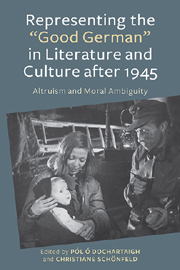Book contents
- Frontmatter
- Contents
- List of Illustrations
- Acknowledgments
- Introduction: Finding the “Good German”
- 1 Re-Presenting the Good German: Philosophical Reflections
- 2 “Görings glorreichste Günstlinge”: The Portrayal of Wilhelm Furtwängler and Gustaf Gründgens as Good Germans in the West German Media since 1945
- 3 From Hitler's Champion to German of the Century: On the Representation and Reinvention of Max Schmeling
- 4 Wilhelm Krützfeld and Other “Good” Constables in Police Station 16 in Hackescher Markt, Berlin
- 5 The “Good German” between Silence and Artistic Deconstruction of an Inhumane World: Johannes Bobrowski's “Mäusefest” and “Der Tänzer Malige”
- 6 Saints and Sinners: The Good German and Her Others in Heinrich Böll's Gruppenbild mit Dame
- 7 Being Human: Good Germans in Postwar German Film
- 8 “The Banality of Good”? Good Nazis in Contemporary German Film
- 9 Memories of Good and Evil in Sophie Scholl — Die letzten Tage
- 10 Deconstructing the “Good German” in French Best Sellers Published in the Aftermath of the Second World War
- 11 Macbeth, Not Henry V: Shakespearean Allegory in the Construction of Vercors's “Good German”
- 12 A Good Irish German: In Praise of Hugo Hamilton's Mother
- 13 Shades of Gray: The Beginnings of the Postwar Moral Compromise in Joseph Kanon's The Good German
- Works Cited
- Filmography
- Notes on the Contributors
- Index
8 - “The Banality of Good”? Good Nazis in Contemporary German Film
Published online by Cambridge University Press: 05 June 2013
- Frontmatter
- Contents
- List of Illustrations
- Acknowledgments
- Introduction: Finding the “Good German”
- 1 Re-Presenting the Good German: Philosophical Reflections
- 2 “Görings glorreichste Günstlinge”: The Portrayal of Wilhelm Furtwängler and Gustaf Gründgens as Good Germans in the West German Media since 1945
- 3 From Hitler's Champion to German of the Century: On the Representation and Reinvention of Max Schmeling
- 4 Wilhelm Krützfeld and Other “Good” Constables in Police Station 16 in Hackescher Markt, Berlin
- 5 The “Good German” between Silence and Artistic Deconstruction of an Inhumane World: Johannes Bobrowski's “Mäusefest” and “Der Tänzer Malige”
- 6 Saints and Sinners: The Good German and Her Others in Heinrich Böll's Gruppenbild mit Dame
- 7 Being Human: Good Germans in Postwar German Film
- 8 “The Banality of Good”? Good Nazis in Contemporary German Film
- 9 Memories of Good and Evil in Sophie Scholl — Die letzten Tage
- 10 Deconstructing the “Good German” in French Best Sellers Published in the Aftermath of the Second World War
- 11 Macbeth, Not Henry V: Shakespearean Allegory in the Construction of Vercors's “Good German”
- 12 A Good Irish German: In Praise of Hugo Hamilton's Mother
- 13 Shades of Gray: The Beginnings of the Postwar Moral Compromise in Joseph Kanon's The Good German
- Works Cited
- Filmography
- Notes on the Contributors
- Index
Summary
The fascination with fascism, whether in Germany or abroad, continues as strongly as ever, and — as Jewish historian Yaffa Eliach mordantly commented with reference to the Holocaust industry — “There's no business like Shoah business.” An analysis of recent representations of Nazism and its aftermath in contemporary film will uncover a shift towards the depiction of Nazis as victims as well as heroes. As many of these films are used in educational settings, with the intention of enlightening students about the Nazi period and contributing to the teaching of values (Werteerziehung), their showcasing of exemplary conduct by both victims and perpetrators blurs the definition of “good,” both in the context of filmic reality and by today's standards. This fluid morality will be discussed in view of the numerous “good Nazis” represented on screen in recent years.
Three internationally acclaimed productions exemplify this shift in the depiction of good and evil: Oliver Hirschbiegel's Der Untergang (Downfall, 2004), Stefan Ruzowitzky's Die Fälscher (Counterfeiters, 2007), and Marc Rothemund's film Sophie Scholl — Die letzten Tage (Sophie Scholl — The Final Days, 2005). All of these films attempt a representation of Nazism in the style of historical reproduction and create the illusion that the viewer is witnessing a historical reality, with complex individuals behaving in diverse ways when confronted with moral challenges. All three productions also share parallels with regard to their reception, having found their way not just to international box offices, but also into the German school curriculum, with the re-enactment of history as spectacle apparently being seen as lending itself as much to education as to entertainment.
- Type
- Chapter
- Information
- Representing the "Good German" in Literature and Culture after 1945Altruism and Moral Ambiguity, pp. 138 - 150Publisher: Boydell & BrewerPrint publication year: 2013



